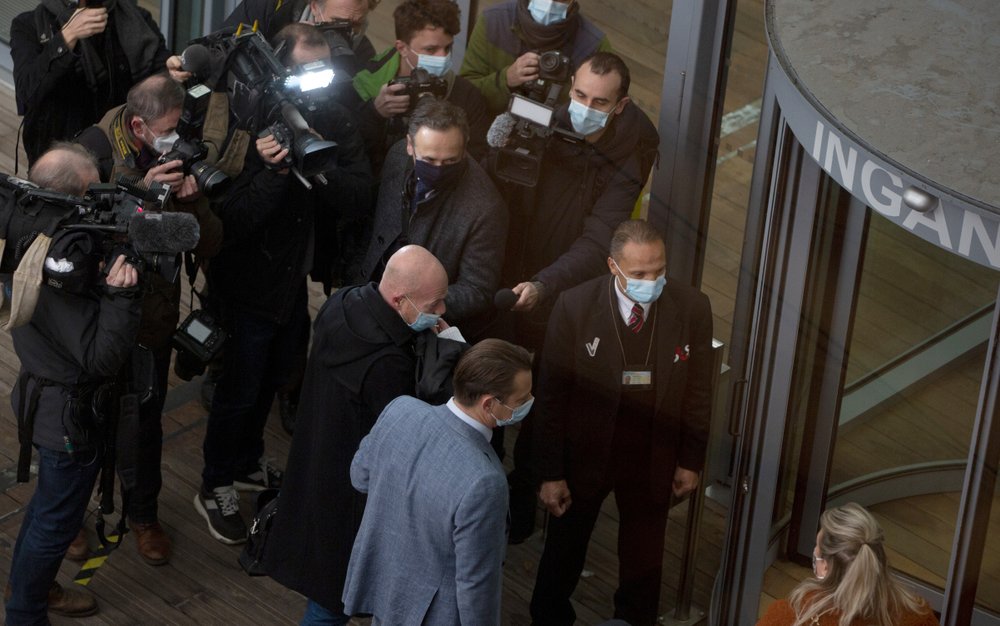An Iranian diplomat suspected of masterminding a thwarted, state-sponsored bomb attack against an exiled Iranian opposition group in France did not show up at a courthouse in Belgium on the opening day of his trial on terror charges Friday, invoking his diplomatic immunity.
More than two years after the cross-border police operation that foiled the plot, Assadollah Assadi and three other suspects face up to 20 years in prison on charges of “attempted terrorist murder and participation in the activities of a terrorist group.”
Lawyers from the plaintiffs and representatives of the Mujahedeen-e-Khalq opposition group, or MEK, claimed without offering evidence that Assadi — who is in custody — was ordered by Iran’s Foreign Minister Mohammad Javad Zarif not to attend the trial. Plaintiffs claim that the diplomat set up the attack on direct orders from Iran’s highest authorities. Tehran has denied having a hand in the plot.
“The Iran state conspires, threatens and carries on attacks and executions,” said lawyer Georges Henri Beauthier. “We have irrefutable proof that the Iranian state gave orders from Tehran and authorized the death of thousands of people.”
Assadi, 48, denies all charges.
Following a full day of hearings at the Antwerp courthouse, public prosecutors requested a maximum prison sentence of 20 years, if Assadi is convicted.
His lawyer, Dimitri de Beco, said his client considers “the court is not competent to judge him” due to his diplomatic status. De Beco said he will also raise procedural issues during a second hearing set for next week. Lawyers for the plaintiffs retorted Friday that diplomatic immunity does not equate to “impunity.”
A verdict is expected be delivered by the end of next month or early next year.
The case has the ingredients of a classic spy novel.
On June 30, 2018, Belgian police officers tipped off by intelligence services about a possible attack against the annual meeting of the MEK, stopped a couple traveling in a Mercedes car. In their luggage, they found 550 grams of the unstable TATP explosive and a detonator.
Belgium’s bomb disposal unit said the device was of professional quality. It could have caused a sizable explosion and panic in the crowd, estimated at 25,000 people, that had gathered that day in the French town of Villepinte, north of Paris.
Despite a security perimeter spanning several hundred meters, an officer was injured when the bomb accidentally went off during the clearing operation.
Assadi was arrested a day later in Germany and transferred to Belgium. Regarded by prosecutors as the “operational commander” of the attack, he is accused of recruiting the couple of Iranian heritage — Amir Saadouni and Nasimeh Naami — years before the attack, to obtain information about the opposition.
Investigators also said that Assadi carried the explosives to Austria in a commercial flight from Iran and later handed the bomb over to the pair during a meeting at a Pizza Hut restaurant in Luxembourg.
A note from Belgium’s intelligence and security agency seen by The Associated Press identified Assadi as an officer of Iran’s intelligence and security ministry who operated under cover at Iran’s embassy in Vienna. Belgium’s state security officers said he worked for the ministry’s so-called Department 312, the directorate for internal security, which is on the European Union’s list of organizations regarded as terrorist.
The fourth suspect, Mehrdad Arefani, is an Iranian poet who was in Villepinte, a commune outside Paris, on the day of the planned attack. Investigators found he was in possession of a phone with Assadi’s number. Prosecutors requested a 15-year prison sentence for Arefani and 18 years for Saadouni and Naami.
Based near Paris, the MEK, once an armed organization with a base in Iraq, is the most structured among exiled Iranian opposition group, and detested by Iranian authorities. It was removed from European Union and U.S. terrorism lists several years ago after denouncing violence and getting Western politicians to lobby on its behalf.
In 2018, among dozens of prominent guests attending the MEK’s annual rally were Trump’s lawyer Rudy Giuliani, a regular headliner, along with Newt Gingrich, former speaker of the U.S. House of Representatives, and former Colombian presidential candidate Ingrid Betancourt.
(AP)











